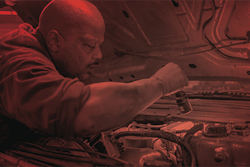Implementing alternative powertrains is a learning curve for fleets and dealers alike. In the case of battery electric and hydrogen fuel cell technology, dealer associates are required to receive OEM training on the equipment before selling it.
Both sides believe that’s a good idea.
“We want to make sure our dealers are prepared to support customers and to do that they need training,” says Jared Ruiz, EV leader and vice president at Volvo Trucks North America. “This equipment is much different than what our dealers — and customers — are accustomed to. It is important that every employee at a dealership goes through safety training to understand the product and how to handle it.”
“Our people are experts on traditional [internal combustion] powertrains. They know how they work, how to sell them, service them and how to be safe around them,” adds Alexander Voets, general manager, EV, at Velocity Vehicle Group. “That’s not the case with EVs.
“For us to support this technology, we have to be experts like we are with diesel.”
OEMs created curricula for dealers tailored to that goal. With distinct training for each department within a dealership — technician and sales courses being the most expansive — manufacturers have training programs designed to educate anyone who may come in contact with an EV or alternative powertrain on how to be safe and smart around the unit.
“Our goal is to make sure every touch point understands what the process is around this equipment,” says Ruiz.










